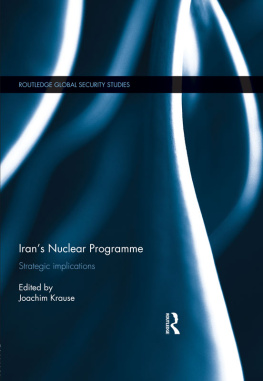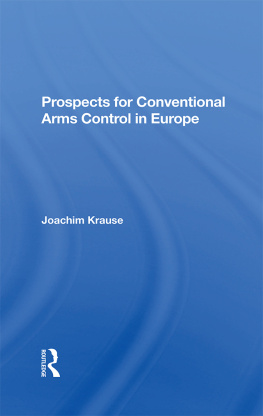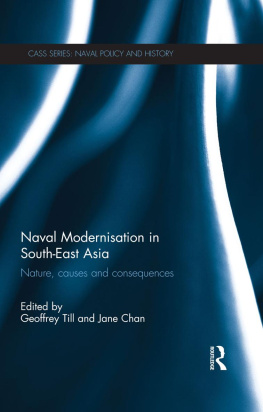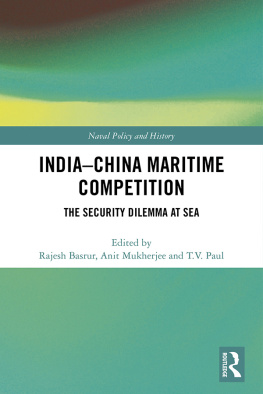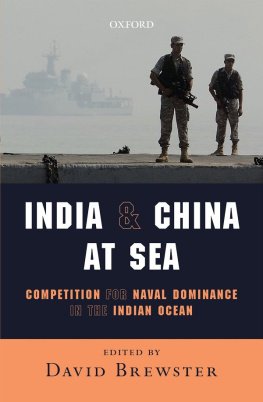ROUTLEDGE HANDBOOK OF NAVAL STRATEGY AND SECURITY
This new handbook provides a comprehensive overview of the issues facing naval strategy and security in the twenty-first century.
Featuring contributions from some of the worlds premier researchers and practitioners in the field of naval strategy and security, this handbook covers naval security issues in diverse regions of the world, from the Indian Ocean and the Mediterranean to the Arctic and the piracy-prone waters off East Africas coast. It outlines major policy challenges arising from competing claims, transnational organized crime and maritime terrorism, and details national and alliance reactions to these problems. While this volume provides detailed analyses on operational, judicial, and legislative consequences that contemporary maritime security threats pose, it also places a specific emphasis on naval strategy. With a public very much focused on the softer constabulary roles naval forces play (such as humanitarian assistance, disaster relief, naval diplomacy, maintenance of good order at sea), the overarching hard-power role of navies has been pushed into the background. In fact, navies and seapower have been notably absent from many recent academic discussions and deliberations of maritime security. This handbook provides a much-desired addition to the literature for researchers and analysts in the social sciences on the relationship between security policy and military means on, under, and from the sea. It comprehensively explains the state of naval security in this maritime century and the role of naval forces in it.
This book will be of much interest to students of naval security and naval strategy, security studies and IR, as well as practitioners in the field.
Joachim Krause is Professor of Political Science at the Christian-Albrechts-University of Kiel, Germany, and has published more than 20 books, including, most recently, Afghanistan, Pakistan and Western Strategy (Routledge, 2013, co-edited with Charles King Mallory IV).
Sebastian Bruns is Director of the Center for Maritime Strategy and Security at the Institute for Security Policy, University of Kiel (ISPK), Germany.
ROUTLEDGE HANDBOOK OF NAVAL STRATEGY AND SECURITY
Edited by Joachim Krause and Sebastian Bruns

First published 2016
by Routledge
2 Park Square, Milton Park, Abingdon, Oxon OX14 4RN
and by Routledge
711 Third Avenue, New York, NY 10017
Routledge is an imprint of the Taylor & Francis Group, an informa business
2016 selection and editorial material, Joachim Krause and Sebastian Bruns; individual chapters, the contributors
The right of the editors to be identified as the authors of the editorial material, and of the authors for their individual chapters, has been asserted in accordance with sections 77 and 78 of the Copyright, Designs and Patents Act 1988.
All rights reserved. No part of this book may be reprinted or reproduced or utilised in any form or by any electronic, mechanical, or other means, now known or hereafter invented, including photocopying and recording, or in any information storage or retrieval system, without permission in writing from the publishers.
Trademark notice: Product or corporate names may be trademarks or registered trademarks, and are used only for identification and explanation without intent to infringe.
British Library Cataloguing in Publication Data A catalogue record for this book is available from the British Library
Library of Congress Cataloguing in Publication Data Routledge handbook of naval strategy and security / edited by Joachim Krause and Sebastian Bruns.
pages cm
Includes bibliographical references and index.
1. Naval strategyHandbooks, manuals, etc. 2. Sea-power. 3. Naval history, Modern21st century. I. Krause, Joachim, 1951 editor. II. Bruns, Sebastian, 1982 editor.
V163.R67 2016
359.40973dc23 2015025489
ISBN: 978-1-138-84093-5 (hbk)
ISBN: 978-1-315-73257-2 (ebk)
Typeset in Bembo
by Out of House Publishing
CONTENTS
PART I
Context and concepts
Joachim Krause and Sebastian Bruns
Lutz Feldt
Tim Benbow
PART II
Choke points and strategic areas
Ralf Emmers
Vasco Becker-Weinberg
James R. Holmes
Caitlyn Antrim
Anthony H. Cordesman
Torsten Albrecht, Carlo Masala and Konstantinos Tsetsos
Helga Haftendorn
PART III
Doctrinal and technological issues on the naval agenda
Brian Wilson
Stavros Karlatiras
Nikolaus Scholik
Alison Lawlor Russell
Peter Lehr
Martin N. Murphy
PART IV
Actor perspectives and policy options
Peter M. Swartz
Sarandis (Randy) Papadopoulos
Sebastian Bruns
Eric Grove
Klaus A. R. Mommsen
Vijay Sakhuja
Brahma Chellaney
Xu Hui and Cao Xianyu
Toshi Yoshihara
Diego A. Ruiz Palmer
Rudolf Roy
Torsten Albrecht, CDR (DEU N), is a professor for maritime defense technology and maritime security at Helmut-Schmidt-University/University of German Armed Forces (Hamburg), as well as assistant Branch Chief for the Security Policy Branch in the Planning Office of the German Armed Forces. He serves in the maritime security section of the Directorate of Politics, MoD, Berlin. Albrecht holds PhDs in maritime and polar atmospheric physics (Freie Universitt Berlin/Alfred Wegener Institute for Polar and Marine Research, Department Atmospheric Physics) and in international relations (University of German Armed Forces Munich, Department of International Policy). His academic interests include maritime security policy, maritime operational pictures, and political crises management.
Caitlyn Antrim is Executive Director of the Rule of Law Committee for the Oceans, a committee of experts focused on analysis, education and outreach around issues of the law of the sea. Her speciality is in issues concerning areas of the seas beyond national jurisdiction. Ms Antrim holds the professional degree of Engineer from MIT and is an adjunct professor at the Washington College of Law. In 1982, she served as a Deputy US Representative to the final negotiating session of the UN Conference on the Law of the Sea.
Vasco Becker-Weinberg, Dr. iur. (Hamburg), LL.M (Lisbon), is a professor at the Faculty of Law of the Universidade NOVA de Lisboa and a qualified lawyer at the Portuguese Bar Association. He is the co-coordinator of the LL.M program on Law and Sea-Economy and is undertaking post-doctoral studies in public international law at NOVA. He is also a member of CEDIS Centro de Investigao e Desenvolvimento sobre Direito e Sociedade. He was previously legal advisor to the Portuguese Secretary of the Sea (20132015) and a full-time scholar at the International Max Planck Research School for Maritime Affairs at the University of Hamburg (20082012). Vasco Becker-Weinberg lectures in several Portuguese and foreign universities and has undertaken extensive research at prominent academic institutions. He has written several works in public international law and the law of the sea and is the author of the recent publications Joint Development of Offshore Hydrocarbon Deposits in the Law of the Sea (Springer Verlag: 2014), Proliferation of weapons of mass destruction and shipping interdiction (with Guglielmo Verdirame, OUP: 2015), and Portugals legal regime on marine spatial planning and management of the national maritime space (


